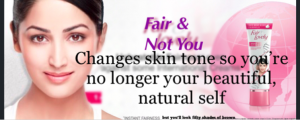Most Asian cultures equate beauty with fairness. The more fair skinned you are, the more beautiful you are and the closer to western culture’s ideal of beauty you are. Many orthodox, Asians continue to instil this mentality in their children. They often prevent kids from spending time in the sun, employ home remedies like turmeric body pastes to lighten skin, bleach their skin, or utilize lotions like Fair and Lovely to maintain it’s fairness. For people who are positioned lower in the social hierarchy, their goals of providing for their families and having fair skin clash. This is why dark skin is often equated with being indigent. While fair skinned individuals enjoy luxurious lives and work indoors, dark skinned individuals often represent those who are poverty-stricken and employed in farmlands. Skin tone is thus representative of social class and beauty, and fair skin is the key to success. If you’re fair skinned, you’ll get the man, you’ll get the job as a model or actress, you’ll get respect for being higher class. For those who don’t have fair skin, obtaining fairness and the luxury that comes with it to alleviate their insecurities, becomes an obsession that companies like Fair and Lovely seek to exploit.
 Celebrity endorsed advertisements are a marketing strategy that has proven to be one of the most effective ways for companies to increase consumerism. Often times, when celebrities do paid advertisements on social media platforms, their followers fall prey to the (often) pseudoscientific results presented to them. This particular Indian advertisement on a fairness cream, likewise, uses Bollywood actress Yami Gautum to promote their product as the ‘must have’ cream for looking as fair and beautiful as Yami. Being named one of iTimes more desirable women, Yami stands as one of the epitomes of beauty for many women.
Celebrity endorsed advertisements are a marketing strategy that has proven to be one of the most effective ways for companies to increase consumerism. Often times, when celebrities do paid advertisements on social media platforms, their followers fall prey to the (often) pseudoscientific results presented to them. This particular Indian advertisement on a fairness cream, likewise, uses Bollywood actress Yami Gautum to promote their product as the ‘must have’ cream for looking as fair and beautiful as Yami. Being named one of iTimes more desirable women, Yami stands as one of the epitomes of beauty for many women.
Problems with this Ad
- She’s already fair skinned. Which falsifies the results of this cream. The cream doesn’t make a difference to her complexion in terms of changing skin tone.
- The Photograph used to show the results has been airbrushed and edited. Half of Yami’s face was purposely made darker than the other half. The results are a mere pretence.
- The potential dangers of using a product that lightens skin are overlooked because its brand ambassador is a celebrity. People don’t look into the ingredients of the product which could prove to be detrimental.
- This advertisement reinforces the idea of fair skin being representative of beauty which not only limits the standards of beauty (to looking a certain way), but could also evoke insecurities in individuals who have darker skin.

Jamming Philosophy
First, I changed Yami’s face to one that shows her having an even skin tone, rather than a before an after. Next, I changed the name of the product to Fair and Not You and the caption underneath to Changes skin tone so you’re no longer your beautiful, natural self, to reject the so-called “correlation” of beauty and fairness. Asians are so obsessed with looking fair skinned, they fail to realize the skin tone they have is a part of who they are and what makes them beautiful. Lastly, I added ‘but you’ll be fifty shades of brown’ to the fine print at the bottom of the picture which said “Instant Fairness”. (Disclaimer: I used ‘brown’ here since it’s an Indian company appealing to Indian people with darker complexions.) The reason I added this is because the product is meant to lighten an individuals face, not the rest of their body. Their face would be fair and the rest of their body would be their natural skin tone- hence “fifty shades of brown”. This distorts the initial image of beauty that people first get upon seeing this advertisement. Credulous consumers would be too focused on the notion of being more fair skinned to consider that only one part of them may be lightened while the rest remains unchanged.
What I aspire to invoke through my jammed advertisement is that all skin tones are beautiful. People possess beauty naturally, and need not feel insecure due to the standards set by certain people within society. Everyone’s concept of beauty is different, and skin tone should not be a determining factor of what is and isn’t deemed beautiful. When people undergo changes to fit society’s standards of beauty, they lose their natural allure because they’re undergoing changes for the sake of fulfilling unrealistic expectations of what is considered ‘beautiful’. Fair skin holds no superiority over dark skin when it comes to defining what beauty is, and vice-versa. My primary goal here, is to elucidate a new standard of beauty that is all-inclusive. People are beautiful just the way they are and, having certain attributes does not make one more or less beautiful.
References
N/A. “Fair and Lovely .” Fairandlovely, Hindustan Unilever 2018, 2018, www.fairandlovely.in/.